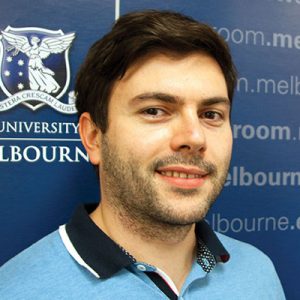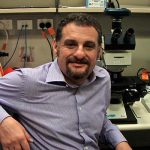
In MS, the insulating layer around nerve fibres, known as myelin is damaged and lost. This loss of myelin is repaired in MS by a special type of cell called oligodendrocyte precursor cells (OPCs) that make new myelin producing cells throughout life. However, in MS this repair is often incomplete, contributing to ongoing disability.
This project will investigate the normal turnover of OPCs in healthy brains, how they generate fresh new myelin producing cells and how that process is controlled. This will be compared to the situation under disease conditions in laboratory models of MS. Additionally, the quality and amount of insulation produced by oligodendrocytes added to the central nervous system during normal development, adulthood and after the onset of MS-like symptoms will be compared.
Dr Mitew will also investigate whether the rate of myelin production can be improved in laboratory models of MS by reactivating the mechanisms for myelin production that occur during development of the brain. Stimulating OPCs to increase in number, mature and produce new myelin may be an exciting new therapeutic approach to combat MS.
Dr Mitew has received an excellent grounding in neuroscience research through his post-graduate studies at the Menzies Institute for Medical Research and has published an impressive number of papers in the course of obtaining his PhD. In electing to join the laboratory of Dr Ben Emery at the University of Melbourne, Dr Mitew will be working with one of the leading lights of research into remyelination in MS.
Dr Mitew has been able to demonstrate that the myelin producing cells, oligodendrocytes, which develop in the young adult brain persist well into adulthood, but each of these oligodendrocytes are gradually lost as a normal consequence of healthy aging. Dr Mitew has then shown in the adult brain these oligodendrocytes are continuously being replaced by newly formed oligodendrocytes at a much higher rate than previously thought. This finding is important as it demonstrated that even in some of the very old mice, there is ongoing oligodendrocyte production and replacement, indicating these animals are still capable of replacing myelin even in old age.
The researchers then compared the myelin produced by oligodendrocytes formed early in development and the myelin produced by oligodendrocytes formed in older brains. They revealed that there is differences in myelin produced. Dr Mitew found that one differentiating feature of these ‘late-born’ oligodendrocytes is that they tend to have shorter but more numerous myelin segments when compared to their early-born counterparts, which could alter the way they relay nerve signals. This suggests that myelin produced later in life is inherently different in quality than that myelin produced during early development. Understanding how this may affect myelin regeneration has important implications for remyelination therapy.
Given that in MS the myelin sheath protecting nerve cells is attacked and damaged, it is important to investigate ways in which this damage can be repaired, as it might form a way of reversing the damage done by MS.
Updated: 29 June 2016
Updated: 05 January, 2014

